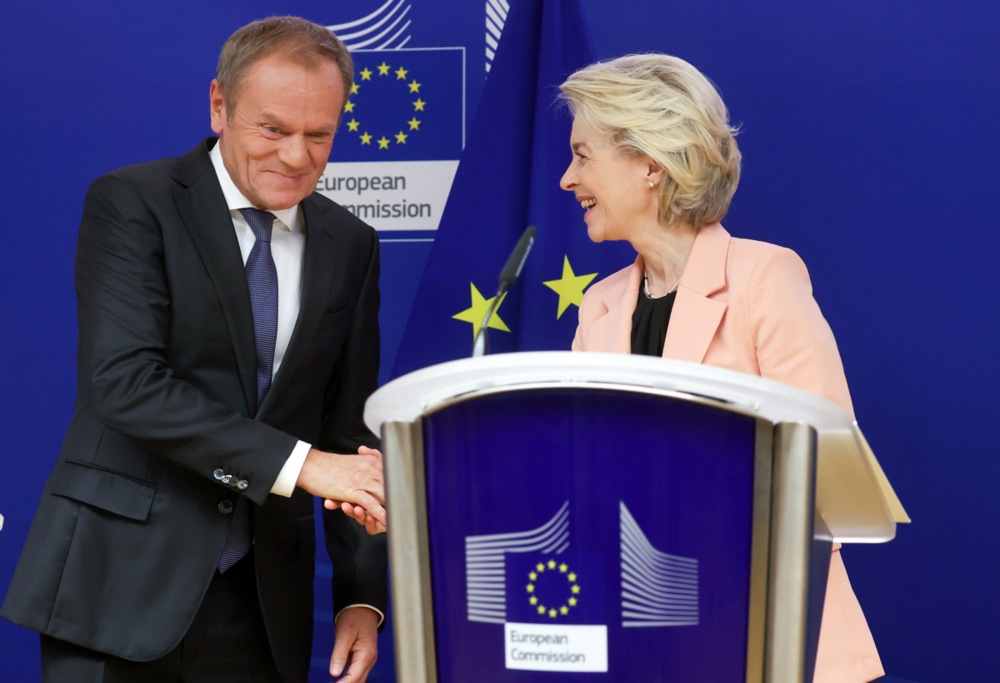Here comes a comparison between how the EU treats a nationalist member state such as Slovakia and an EU-keen member state such as Poland.
The injustice in the treatment is embarrassing, but nobody in Brussels is blushing.
Look first at what the EU is doing to Slovakia.
In September, Slovakia’s Prime Minister Robert Fico’s left-wing sovereigntist Smer party emerged victorious in the country’s parliamentary elections. This was after a campaign that included Fico’s criticism of Western anti-Russian sanctions. He also pledged to defend Slovakian national interests and cease military aid to Ukraine.
The Slovakian voters liked these vote-winning policies. The result is the EU has now singled out Fico, Smer and their country for “rule-of-law” concerns.
That is the technical term for threatening to interfere with Slovakia’s EU powers as a member state and cutting off millions of euro the EU should pay Slovakia.
All because Slovakians voted “wrong.”
So very wrong. Fico’s dismissal of military aid to Ukraine, a country besieged with government corruption, his denunciations of EU trade restrictions on Russia, and his sovereigntist style of governance meant every part of Brussels piled on the criticism.
Last October Fico’s Smer party was suspended from the European Parliament’s centre-left S&D group. The group did not like Smer’s openness to work with nationalists and their lack of support for Kyiv.
An article in Politico accused Fico’s pro-peace and sovereigntist government of the following: “From attempts to control the public media to the abolition of a special prosecutor’s office and parroting Russian propaganda, Slovakia’s ruling coalition is taking pages out of Hungarian Prime Minister Viktor Orbán’s playbook when it comes to illiberal views.”
The problem for the Brussels elite is that increasing numbers of plain people in Europe think much of that sounds good.
Additionally, the Fico government decided to dissolve Slovakia’s special prosecutor’s office on March 20 and implement reforms in the country’s criminal code.
The Slovakian government notes that the authority of the special prosecutor’s office was established by the previous government to probe organized crime and corruption cases.
Instead, the office has pursued cases related to officials, police officers, judges, prosecutors, politicians, and businesspeople connected with Fico’s Smer party. This prompted Fico to slam the authority, which is led by his political foe, former justice minister Daniel Lipšic, for being politically biased.
The Fico government maintains that the dissolution of the special prosecutor’s office is an internal Slovakian matter instead of a European cause of concern.
Hungarian Fidesz MEP Balázs Hidvéghi supported this view in an EP debate regarding Slovakia last December:
“The criminal law reform presented by the new Slovak government is an internal affair. It should be debated, thoroughly, in Slovakia. The issue has nothing to do on the agenda of the European Parliament.”
“A few months ago, Slovakia made a clear decision at the elections: after several years of political instability, they elected a new government to take power. Whether the current majority of this house likes this result or not, is completely irrelevant. This house should not be used to take revenge for an election defeat.”
Hidvéghi’s remarks had no effect on the vote, as the left-liberal EP majority still adopted a resolution (with 496 votes for, 70 against and 64 abstentions) which challenged Slovakia’s ability to maintain the EU budget and combat corruption should Bratislava implement the criminal code reforms.
On January 15 this year, the EP adopted a resolution which “notes with concern the planned restructuring of Radio and Television of Slovakia, the country’s main public broadcaster.”
The same document also lambasted Fico for using “divisive language in order to polarize Slovak society” and for his government’s alleged “unjustified accelerated legislative process, particularly regarding the proposed amendments to the criminal code and the dissolution of the Special Prosecutor’s Office.”
At which point, we compare this treatment of Slovakia with the EU’s treatment of Poland.
Donald Tusk’s government in Warsaw, which is getting rid of public sector conservatives in a style which is positively pre-Glasnost, oversaw a hostile purge of Poland’s state broadcaster TVP owing to its links with the former PiS (Law and Justice) government.
Late last year, police officers marched into the TVP headquarters in Warsaw on December 20 as senior PiS members, including former Polish Prime Minister Jarosław Kaczyński, tried to stage a sit down protest against what they regarded as excessive authoritarianism by the pro-EU Tusk regime.
Much to the delight of his Brussels colleagues, Tusk also vowed to conduct an institutional purge of conservative aspects in Polish institutions, in the wake of globalist tycoon George Soros’s surprise purchase of Rzeczpospolita, one of Poland’s prominent news outlets.
Professor Mieczysław Ryba, from the College of the Institute of National Remembrance–Commission for the Prosecution of Crimes against the Polish Nation, condemned Tusk’s moves to purge TVP as an “attack on public media”, cautioning that what Tusk did to TVP could be the first in a series of moves undermining media freedom in Poland.
In what was called a “Protest for Free Poles,” tens of thousands of people gathered in Warsaw in January this year protesting Tusk’s hostile purge of TVP.
Moreover, police raided Poland’s Presidential Palace to arrest two ex-PiS ministers in what has been decried as a politically motivated stunt to imprison resistance elements against the Tusk government.
Furthermore, legislation is underway to remove the nation’s top judge, Julia Przyłębska, known for her conservative inclinations.
The EU has largely remained silent towards Poland’s speedy descent into authoritarian government. In Brussels, assaults on Polish conservatives persist, with various conservative MEPs facing potential hate speech charges after an NGO-led push to remove their individual parliamentary immunity passed the final hurdle in the EP.
Note that during the country’s eight years of conservative PiS governance, the EU regularly berated Poland as an authoritarian state due to the PiS government’s relatively conservative views (compared to other pro-EU governments) on family, abortion and nationalism.
The European Conservative quoted PiS spokesman Rafał Bochenek as slamming the illegality of the Tusk government’s campaign against TVP as well as the EU’s double standards towards the Tusk regime and the former PiS administration in regard to media consolidation.
“It is unprecedented that one Polish politician has such influence on the media in a democratic Poland,” Bochenek bemoaned, alluding to Polish Culture Minister Bartłomiej Sienkiewicz, an ardent Tusk ally, in the recent purge of TVP.
Glasnost is over in Poland.





Let’s give Austria-Hungary a chance – Europe needs some Habsburg values